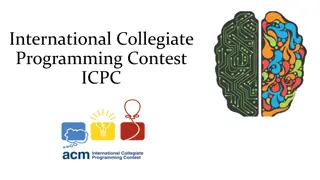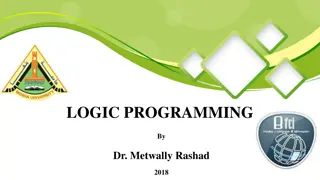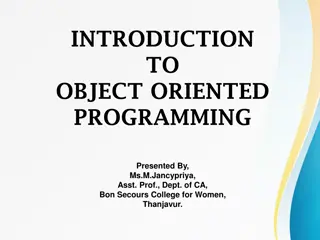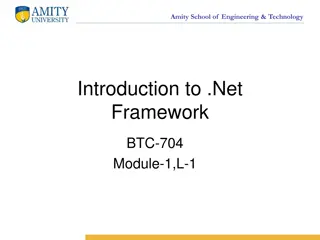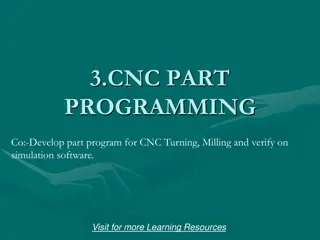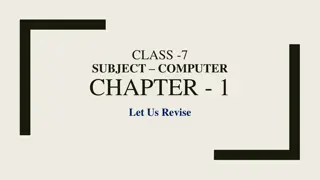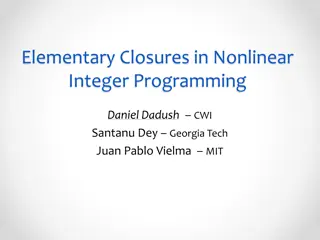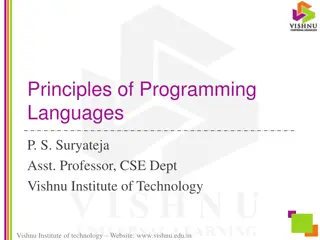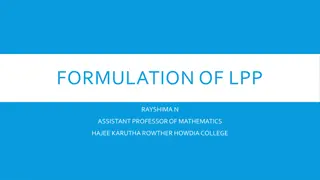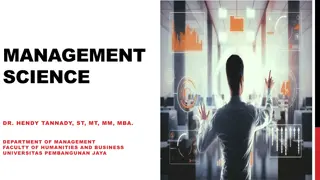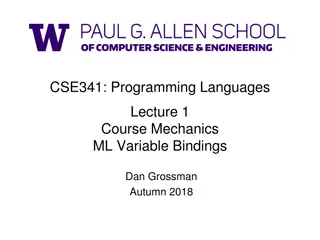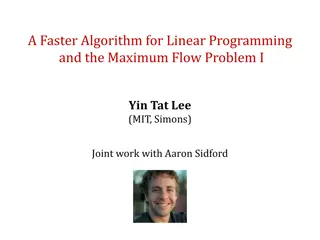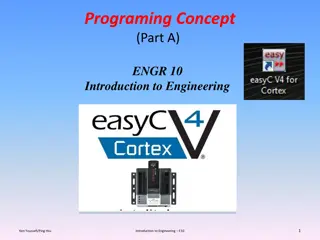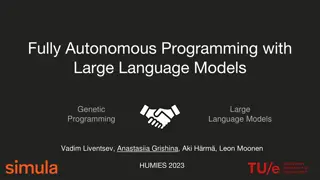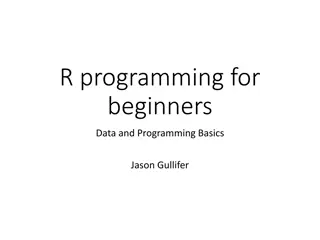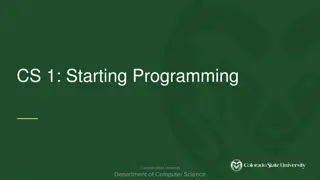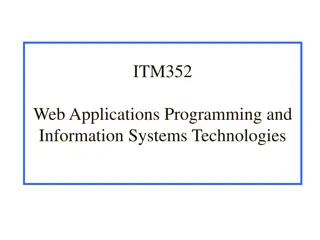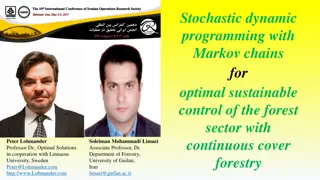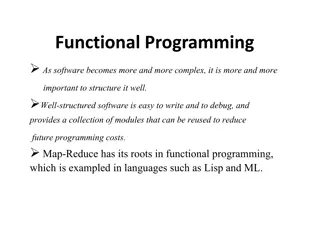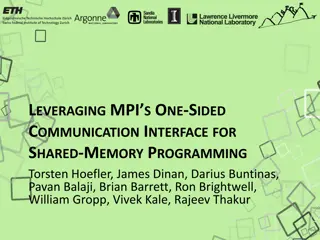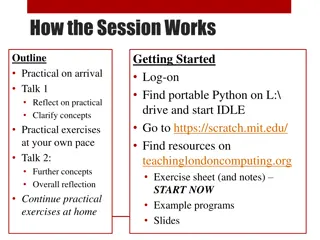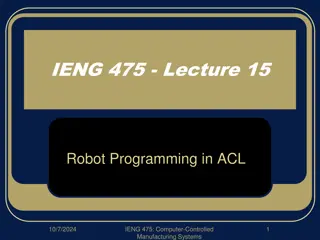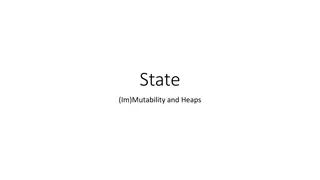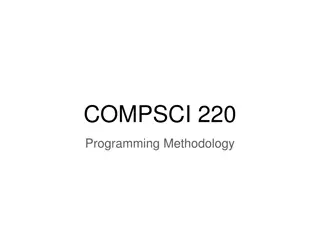Functional Programming
Functional programming, a paradigm that emphasizes declarative programming, pure functions, and limited side effects. Explore the benefits and characteristics of functional programming languages.
0 views • 20 slides
Programming in C: Overview and Constants Explanation
Programming in C is a fundamental introductory guide to the C programming language. It covers the basics of C, including its development history, character set, constants, and rules for constructing constants like integer and real constants. Dr. M. A. JAMAL MOHAMED YASEEN ZUBEIR, an Assistant Profes
4 views • 33 slides
International Collegiate Programming Contest (ICPC) Overview and Rules
The International Collegiate Programming Contest (ICPC) is a prestigious global competition in competitive programming supported by major tech companies like Google and Facebook. Participants tackle logical and mathematical problems by developing efficient algorithms and implementing them in various
5 views • 17 slides
Logic Programming and AI Principles
This course focuses on logic programming principles applied to AI problems. Topics include Prolog programming, backtracking, recursive rule definition, built-in predicates, lists manipulation, and advanced techniques. Declarative languages like Prolog differ from procedural languages by describing p
1 views • 26 slides
Object Oriented Programming (OOP) Principles
Object-Oriented Programming (OOP) is a software design approach where programmers define data structures and operations. Key principles include objects, classes, data encapsulation, inheritance, polymorphism, and data abstraction. OOP allows for better organization and reusability of code, fostering
0 views • 15 slides
Decision Analysis and Operations Research in Management
This content delves into Management Decision Analysis and Operations Research techniques such as Linear Programming, Integer Linear Programming, Dynamic Programming, Nonlinear Programming, and Network Programming. It covers the phases of an Operations Research study, mathematical modeling for decisi
0 views • 36 slides
Introduction to Amity School of Engineering & Technology
Amity School of Engineering & Technology offers courses in .NET Framework, Windows GUI development, C/C++ programming, Visual Basic, and Java/J2EE programming. The curriculum covers topics such as Win32 API, MFC, object-oriented programming, and web development. Students learn to develop application
1 views • 14 slides
Module 2: PSEA and Safe Programming Training of Trainers (ToT) by CRS HRD
This Module 2 focuses on PSEA and Safe Programming, covering key sessions on understanding safe programming, identifying protection and SEA risks, and mitigating risks. It emphasizes the importance of safe programming in increasing safety, dignity, and access, with staff playing a crucial role. Part
3 views • 19 slides
Comprehensive Guide to CNC Part Programming
Learn about CNC part programming for turning and milling machines. Understand the importance of part programs, program input devices, machine control unit functions, and CNC programming methods like offline and conversational programming. Explore the Cartesian coordinate system, tool positioning, an
0 views • 61 slides
Computer Programming: Basics and Beyond
In this chapter, we delve into the fundamental concepts of computer programming. We explore the definition of a program, the role of programming languages, types of programming languages, and generations of programming languages. Additionally, an assignment is provided to reinforce the key learnings
0 views • 25 slides
Advances in Integer Linear Programming and Closure Techniques
Explore cutting planes, convex integer programming, Chvátal-Gomory cuts, and closure methods in nonlinear integer programming. Discover how these techniques enhance the efficiency and effectiveness of integer programming models, leading to substantial progress and improved solutions.
1 views • 40 slides
Object-Oriented Programming (OOP) in Python
Python is a versatile programming language that supports various programming approaches. Object-Oriented Programming (OOP) is a popular method in Python where objects are created to solve programming problems. OOP in Python focuses on creating reusable code, following the principle of DRY (Don't Rep
2 views • 35 slides
Principles of Programming Languages at Vishnu Institute of Technology
Introduction to Principles of Programming Languages course including prerequisites, objectives, outcomes, and syllabus at Vishnu Institute of Technology. The course covers key concepts, popular programming paradigms and languages, practical knowledge in lexical analysis and parsing, as well as writi
1 views • 43 slides
Formulation of Linear Programming Problems in Decision Making
Linear Programming is a mathematical technique used to optimize resource allocation and achieve specific objectives in decision-making. The nature of Linear Programming problems includes product-mix and blending problems, with components like decision variables and constraints. Various terminologies
1 views • 14 slides
Introduction to Computers and C++ Programming Lecture 1 - Overview and Basics
This lecture covers the fundamental concepts in computer systems and programming using C++. Topics include the main components of a computer, bytes and addresses in memory, computer systems hardware and software, understanding programs, programming languages, compilers, preparing and running C++ pro
2 views • 21 slides
Linear Programming: A Tool for Optimizing Business Operations
Explore the application of linear programming in business, as exemplified by the case study of San Miguel Corporation. Learn how linear programming models can help maximize profits, optimize resource allocation, and streamline decision-making processes in various industries. Discover the fundamental
1 views • 19 slides
Autumn 2018 CSE341 Programming Languages Course Overview
Welcome to the Autumn 2018 CSE341 course on Programming Languages! Join us for a comprehensive 10-week journey to grasp the core concepts that underlie all programming languages. Dive into ML, Racket, and Ruby while honing your programming skills through homework assignments. Engage with the course
1 views • 32 slides
Web Application Development and Programming CTE Program Overview
Viera High School offers a comprehensive CTE program in Web Application Development and Programming, taught by Mr. Dohmen. Students learn popular programming languages like Python, SQL, JavaScript, Java, C#, and C. The courses cover web programming, JavaScripting, and PHP programming, providing cert
3 views • 7 slides
Introduction to Programming with RobotC in Robotics Education
Programming in robotics involves giving specific directions to a robot using software like RobotC. This introduction covers the basics of programming, software organization, and how to get started with RobotC through creating flow charts and programming tasks. Learn about setting up RobotC, creating
1 views • 8 slides
Introduction to Programming and Computer Instructions
Programming is the process of creating instructions for computers to follow and accomplish tasks. It involves turning human language instructions into detailed binary machine language. Before learning programming, individuals may have different levels of experience, ranging from no experience to pro
0 views • 16 slides
A Faster Algorithm for Linear Programming and the Maximum Flow Problem
A comprehensive overview of a new algorithm for linear programming and the maximum flow problem developed by Yin Tat Lee and Aaron Sidford from MIT and Simons. The algorithm aims to improve efficiency by reducing the number of iterations required to reach the optimal solution. It discusses the histo
0 views • 40 slides
Development of Attosecond Theory for Nobel Prize through Verilog Programming
Attosecond generation is a crucial technique for creating attosecond pulses by manipulating radiation waves. This research paper focuses on developing the Attosecond generation equation through Verilog programming and validating it using test programming techniques. The interface between equations,
2 views • 15 slides
Introduction to Computer Programming in Engineering
Computer programming in engineering involves breaking down tasks into small steps to instruct a computer. This process requires understanding programming languages such as C, C++, and Java, and concepts like Object-Oriented Programming (OOP). The sequential execution of expressions and the importanc
0 views • 36 slides
Fully Autonomous Programming: Advancing Software Development Through AI
Explore the concept of fully autonomous programming using large language models and genetic programming, aimed at enabling more individuals to create software products with a focus on creativity and rapid prototyping. The proposed framework involves synthesizing, executing, instructing, debugging, a
0 views • 11 slides
CS252 Systems Programming Course Overview
This course overview covers topics such as C programming review, Unix basics, Unix systems programming, and grading details. The course includes labs on C/C++ programming, Unix shell scripting, and writing your own shell. Communication is emphasized through Piazza for questions/answers and Blackboar
0 views • 41 slides
Introduction to R Programming for Beginners: Data and Programming Basics
Learn the fundamental concepts of R programming for beginners, covering topics such as data checking, changing types, working with data frames, factors, NA values, and optimal data formatting. Understand the importance of tidy data and experiment design, along with practical examples and tips to enh
0 views • 27 slides
Introduction to Programming Concepts at Colorado State University
Engage in the fundamentals of programming at Colorado State University's Department of Computer Science. Explore topics such as variable declaration and assignment, data types, and the importance of programming. Develop essential skills to read, write, and understand basic program structures. Enhanc
0 views • 14 slides
Importance of Programming Diversity in Television Broadcasting
Diversity of programming in television is crucial for democracy and meeting the varied needs of audiences. The content emphasizes the significance of quality, independent programming that reflects a spectrum of opinions to inform the public effectively. It also discusses the impact of TV content on
0 views • 13 slides
Introduction to Programming Languages and Functional Programming with OCaml
Welcome to Lecture 1 of CSEP505 on Programming Languages focusing on OCaml and functional programming. Professor Dan Grossman introduces the course, discusses the importance of studying programming languages, and shares insights on course mechanics and content. Topics include staff introductions, co
1 views • 84 slides
ITM352 and Its Role in MIS
Welcome to ITM352, a course focusing on acquiring basic programming skills in a business context. This course emphasizes hands-on experience in developing relevant software applications, addressing real technology problems, and fostering rapid self-learning of IS/IT technologies. Misconceptions arou
0 views • 36 slides
Optimal Sustainable Control of Forest Sector with Stochastic Dynamic Programming and Markov Chains
Stochastic dynamic programming with Markov chains is used for optimal control of the forest sector, focusing on continuous cover forestry. This approach optimizes forest industry production, harvest levels, and logistic solutions based on market conditions. The method involves solving quadratic prog
1 views • 27 slides
Functional Programming Paradigm
Functional programming emphasizes well-structured software that is easy to write and debug, with reusable modules to reduce future programming costs. It introduces higher-order functions and first-class function values, fostering declarative programming for tasks like symbolic data manipulation and
0 views • 21 slides
Essential Principles of Teaching Programming Languages
Foundational concepts in programming form the core of computing. This encompasses understanding programming fundamentals, teaching language aspects effectively, statistical programming for data analysis, and guiding students unfamiliar with programming environments towards grasping the logic and sim
0 views • 23 slides
Leveraging MPI's One-Sided Communication Interface for Shared Memory Programming
This content discusses the utilization of MPI's one-sided communication interface for shared memory programming, addressing the benefits of using multi- and manycore systems, challenges in programming shared memory efficiently, the differences between MPI and OS tools, MPI-3.0 one-sided memory model
1 views • 20 slides
Computer Programming Principles
Dive into the world of computer programming, covering high-level and machine languages, compilers, interpreters, writing programs, top-down design, and the array of programming languages available. Understand the essentials of building code to control computers, the diversity of programming language
0 views • 23 slides
Transitioning from Scratch to Python: A Practical Approach for Learning Textual Programming
Explore the transition from visual programming in Scratch to textual programming in Python using Turtle Graphics. Engage in practical exercises, clarify key concepts, and reflect on the challenges and progress in learning core programming concepts. Utilize resources from TeachingLondon Computing to
0 views • 21 slides
Computer-Controlled Manufacturing Systems: Robot Programming in ACL
Explore the world of robot programming in ACL through hands-on assignments, documentation practices, and good programming principles. Learn about advanced command languages, teach pendant techniques, and programming sequences for efficient manufacturing systems. Dive into creating ACL programs, unde
0 views • 17 slides
CS 288-102 Intensive Programming in Linux Spring 2017 Course Details
Learn Linux programming, C language proficiency, Bash scripting, and more in this intensive course taught by Instructor C.F. Yurkoski. The course covers programming in Linux environment, command line interface, C language, client/server programming, and essential programming concepts like pointers,
0 views • 31 slides
State, Mutability, and Heaps in Programming
Explore the concepts of (im)mutability, imperative vs. functional programming, referential transparency, and challenges for strict immutability in programming. Learn about the differences between imperative and functional languages, the benefits of referential transparency, and the challenges of mai
1 views • 46 slides
Functional Programming Concepts for COMPSCI 220 Programming Methodology
In this tutorial, we explore functional programming concepts in the context of COMPSCI 220 Programming Methodology. We delve into writing functions using `reduce` and discuss examples and implementations of various functions like sum, product, and string length calculation. We also analyze the diffe
1 views • 47 slides


